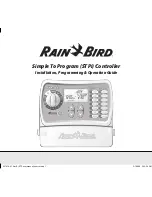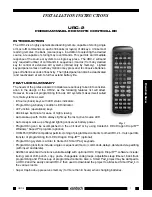
15
EATON
EP Control for Medium Duty 72400 Piston Pumps Parts & Service 08-10-0003-EN-0901 September 2001
Flow Only in One
Defective Check Solenoid Coil. Disconnect the two-pin power supply and the three-pin command
Direction (con’t)
Solenoid Coil
input device connectors from the EP Control electronic module. Inspect the connectors
for corrosion, loose contacts, loose wires and broken wires. Remove the EP Control
electronic module. Refer to instructions on page 5. Disconnect the two mating four-pin
connectors. Measure the coil resistance across the designated pins at the solenoid
four-pin connector. Refer to the Solenoid 4-pin Connector chart on page 17 for typical
readings.
Defective Solenoid
Check Solenoid Tube Subassembly. Disconnect the two-pin power supply and the
Tube Subassembly
three-pin command input device connectors from the EP Control electronic module.
Inspect the connectors for corrosion, loose contacts, loose wires and broken wires.
Remove the two solenoid tube subassemblies. Visually inspect the actuator pin in the
tube subassembly. The pin should be free to move.
Defective
Check Electronic Module. Disconnect the two-pin power supply and the three-pin
Electronic Module
command input device connectors from the EP Control electronic module. Inspect the
connectors for corrosion, loose contacts, loose wires and broken wires. Remove the EP
Control electronic module. Refer to instructions on page 5.
Caution:
The engine or
motor driving the pump should not be running. Connect command input device and
power supply to the electronic module. Measure the current to the coil at the four-pin
connector. Activate the input device end to end and at neutral. Monitor the current on
one coil, and then on the other. Refer to Command Input Device chart on page 17 for
typical readings.
Flow in Neutral
Command Signal
Check Command Input Signal. Disconnect the three-pin command input device
Incorrect
connector from the EP Control electronic module. Inspect the two connectors for
corrosion, loose contacts, loose wires and broken wires.
If 1-6 Vdc joystick or potentiometer is used, measure the DC voltage across pins “A” and
“B” at the connector. Move the joystick or potentiometer position. The voltage reading
will be approximately 2.5 volts DC at joystick neutral or the half range position of the
potentiometer. The DC voltage will be approximately 5 volts at one end of the joystick or
potentiometer travel. At the opposite end of travel the DC voltage will be approximately
zero.
If ±4-20 mA current loop input is used, measure the DC voltage across pins “A” and “B”
at the connector. The DC voltage reading should be approximately zero at zero input cur-
rent which occurs at command input neutral. The DC voltage reading should be approxi-
mately ±5 volts for input command currents of ±20 mA respectively.
Neutral Out of
Check Neutral Adjustment. Disconnect the two-pin power supply and the three-pin
Adjustment
command input device connectors from the EP Control electronic module. Inspect the
connectors for corrosion, loose contacts, loose wires and broken wires. Remove the EP
Control electronic module. Refer to instructions on page 5. Disconnect the two four-pin
solenoid connectors. Follow instructions for setting neutral on page 9 Step 15.
Flow Limited,
Command Signal
Check Command Input Signal. Disconnect the three-pin command input device
Cannot Achieve
Incorrect
connector from the EP Control electronic module. Inspect the two connectors for
Full Pump Stroke
corrosion, loose contacts, loose wires and broken wires.
If 1-6 Vdc joystick or potentiometer is used, measure the DC voltage across pins “A” and
“B” at the connector. Move the joystick or potentiometer position. The voltage reading
will be approximately 2.5 volts DC at joystick neutral or the half range position of the
potentiometer. The DC voltage will be approximately 5 volts at one end of the joystick or
potentiometer travel. At the opposite end of travel the DC voltage will be approximately
zero.
If ±4-20 mA current loop input is used, measure the DC voltage across pins “A” and “B”
at the connector. The DC voltage reading should be approximately zero at zero input cur-
rent which occurs at command input neutral. The DC voltage reading should be approxi-
mately ±5 volts for input command currents of ±20 mA respectively.
SYMPTOM:
CAUSE:
ACTION:
Troubleshooting




































